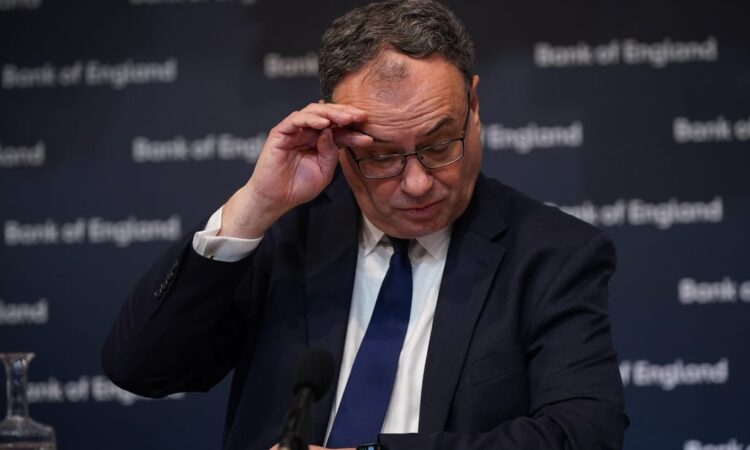
Izabella Kaminska is senior finance editor at POLITICO Europe.
Is the governor of the Bank of England (BoE), Andrew Bailey, sending coded messages that monetary policy in the United Kingdom has reached its limits, and that his job is now redundant?
Could be.
In a speech to the London School of Economics (LSE) last Monday, Bailey dropped a bit of a bombshell.
Focusing on all the reasons central bankers cannot be relied on to avert an economic crisis stemming from structural supply-side issues related to “technological progress, investment and innovation, and by skills and trends in the population,” Bailey abruptly added it’s important to remember that “policy decisions can have unpredictable and complex effects on the economy” — only to reveal in the next breath that the remark had come not from him but ChatGPT, the generative artificial intelligence language model.
But the intermission prompts a serious question: At this point, might an AI robot do a better job at communicating monetary policy than Bailey, whose own track record is — let’s face it — blighted with gaffs?
A failure to communicate is, after all, a serious issue for the field. Linguistic confidence tricks remain one of the most important tools in a central banker’s box of tricks. And when central bankers get the comms right, a single phrase — like “whatever it takes” from former European Central Bank President Mario Draghi — can save an entire financial system.
When they fail to deliver, however, they risk losing the confidence of a nation and become, well . . . Andrew Bailey, a man so unsubtle and superficially unsympathetic, he might as well be an algorithm.
The proposition to replace Bailey with AI in that context isn’t actually as insane as it sounds. It was, after all, the late great American economist Milton Friedman who famously suggested central bankers would one day no longer be needed, as computer programs might be better trusted than emotionally swayed humans to stick to the rules economic brainiacs concluded would always temper inflation.
Freed of any human influence, markets would then be able to self-correct automatically, taming prices in the process. And replacing Andrew Bailey with ChatGPT might just be a good place to start.
It’s hard to imagine it could do worse.
But let’s consider the nature of Bailey’s most egregious mistakes to hammer the point home.
The governor’s poor track record starts with a stubborn insistence that post-pandemic inflation was merely “transitory” — a major faux pas in light of famed British economist John Maynard Keynes’ well-known adage that “in the long run we are all dead.” What Keynes meant by this is that the economy’s tendency to rebalance itself over the long term shouldn’t mean that economists ignore short-term effects, which have a real bearing on human lives — Weimar inflation might otherwise have also been considered transitory.
But Bailey’s takes only went from bad to worse, as by February 2022, he was admitting to the BBC that it would probably be wise for workers not to ask for pay rises — comments that could only be interpreted to mean that the BoE had abruptly flipped from a state of denial to one of quiet panic.
The next unnerving signal came in May, when Bailey noted that BoE interest rate hikes were likely futile in the face of rising food and energy prices brought on by the war in Ukraine. “Sorry for being apocalyptic for a moment, but that is a major concern,” he noted to a House of Commons Treasury Committee, in a message that could only be taken negatively by markets.
Bailey then only compounded alarm by admitting he felt “helpless” in the face of soaring inflation, and that the situation was a “very difficult place for us to be in.”
In recent weeks, Bailey’s comms have somehow hit even lower depths, as he urged “people who are setting prices” to “please understand, if we get inflation embedded, interest rates will have to go up further, and higher inflation really benefits nobody” in an interview with Radio 4.
As any student of history should know — including Bailey, who studied history at Cambridge — this is about the worst thing a central banker can say to inspire confidence. A similar move by the late Roman Emperor Diocletian, who in an attempt to get people to stop raising prices commanded them not to do so, only achieved the exact opposite, largely because it underappreciated the role that market psychology plays in setting prices.
ChatGPT wouldn’t only have known all of the above — it could have been relied on not to lose its cool. When asked if a computer could do the job better, it replied it could “help to improve market psychology by promoting consistency, objectivity, transparency, and faster response time” and “the risk of political interference.”
And if Bailey’s LSE speech is any indication, he might already be planning his successions.
Chances are it won’t be long before we find out if that’s true.





